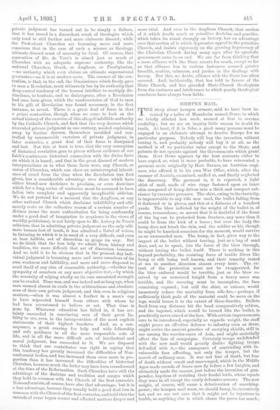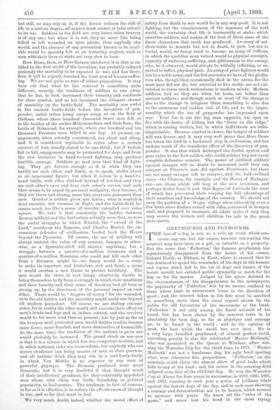HEMPEN MAIL.
THE story about hempen armour, said to have been in- vented by a tailor of Mannheim named Dowe, to which we briefly alluded last week, seemed at first to overtax credulity ; but we see on inquiry little reason to doubt its truth. At least, if it is false, a good many persons must be engaged in an elaborate attempt to deceive Europe for no particular purpose. Nobody will bay the invention without testing it, and_ probably nobody will buy it at all, as the method is of no particular value except to the State, and patents do not operate against the Governments which grant them. Herr Dowe appears by the best accounts either to have copied, or, what is more probable, to have reinvented a garment made originally by Herr Sarneo, an Austrian engi- neer, who offered it to his own War Office, which, after the manner of Austria, examined, sniffed at, and finally neglected the discovery. The garment is, it is reported, a light shirt of mail, made of wire rings fastened upon an inner skin composed of hemp driven into a thick and compact sub- stance by excessive pressure. The shirt, owing to its elasticity, is impenetrable to any rifle now used, the bullet falling from it flattened or in pieces, and this at a distance of a hundred yards. The blow inflicted by the weight of the bullet is, of course, tremendous ; so severe that it is doubtful if the front of the leg can be protected from fracture, any more than it could be from the kick of a horse ; but over the body the hemp does not break the skin, and the soldier so hit, though he might be knocked senseless for the moment, would survive as an unwounded man. The hemp, in fact, gives way to the impact of the bullet without tearing, just as a bag of sand does, and, so to speak, lets the force of the blow through, without letting the bullet itself. There is nothing in this beyond probability, the resisting force of textile fibres like hemp or silk being well known, and their tenacity tested at sea in another direction almost every hour. The ex- tent of the protection must not be exaggerated, for the blow endured would be terrible, just as the blow re- ceived by an armoured knight from a heavy mace was terrible, and the covering must be incomplete, the face remaining exposed ; but still the shirt, or cuirass, would immensely reduce the mortality from rifie-fire,—perhaps, if sufficiently thick pads of the material could be worn on the legs, would lessen it to the extent of three-fourths. Bullets fired from any distance hit the head comparatively seldom, and the bayonet, which would be turned like the bullet, is practically never aimed at the face. With certain improvements sure to be introduced, especially as regards weight, the stuff might prove an effective defence to infantry even as dress, might revive the ancient practice of carrying shields, still in use among the warrior-races of Asia, and might materially affect the fate of campaigns. Certainly troops undefended with the new mail would greatly dislike fighting troops defended with it,—the annoyance of contending with in- vulnerable fees affecting, not only the temper, but the morale of ordinary men. It was not fear of death, but fear of death without result and uiarevenged, which in the Middle Ages made crowds of brave men fly before a few knights, and ultimately made the masses, just before the invention of gun- powder, hopeless of resisting their feudal lords, whose equals they were in all except the costly defensive armour. The new weight, of course, will cause a deterioration of marching- power; the hempen mail must, we should fancy, be excessively hot, and we are not sure that it might not be injurious to health, as anything else is which closes the pores too much ;
but still, we may rely on it, if the device reduces the risk of life in a serious degree, all armies must sooner or later submit to its use. Soldiers in the field are very brave when bravery is of any use ; but when it is not, they no more like being killed or left wounded on open plains, than anybody else would, and the absence of any precaution known to be avail- able would be speedily felt as an irritating neglect, such as men with their lives at stake are very slow to bear.
Herr Dowe, then, or Herr Sarneo, whichever it is that is en- titled to the first credit of the invention, has probably reduced seriously the mortality to be expected in war, and has there- fore, it will be argued, lessened the total sum of human suffer- ing. We are not quite so sure of either proposition. It may turn out that what he has reduced is something quite different, namely, the readiness of soldiers to run away, that he has, in fact, increased their tenacity and readiness for close combat, and so has increased the ultimate chance of mortality on the battle-field. The mortality was awful in the ancient battle-fields before the invention of gun- powder, entire tribes being swept away, as on the field of Chklons, where three hundred thousand brave men fell, or in the battles of the earlier Mahommedans and their foes; the battle of Neha,vend, for example, where one hundred and ten thousand Persians were killed in one day. At present, en- gagements, when actually commenced, are short and sharp, and it is considered reputable to retire after a certain amount of loss, usually stated to be one-third ; but if bullets fail to kill, engagements may be protracted for days, and from the new incentive to hand-to-hand fighting, may produce horrible carnage. Soldiers go mad over that kind of fight- ing. They get furious enough a3 it is when they can hardly see each other, and death, so to speak, stalks about as an impersonal figure; but when it comes to a hand-to- band battle, with rifles clubbed instead of levelled, and they see each other's eyes, and hear each other's curses, and each blow seems to be urged by personal malignity, they become, if they are brave and strong, more like creatures possessed than men. Quarter is neither given nor taken ; what is wanted is dead enemies, not enemies in flight, and the battle-field be- comes much too like a scene of murder extended over miles square. We take it that constantly the battles between Roman soldiers and the barbarians actually were that, as were the awful straggles in which Khaled, the "sword of the Lord," overthrew the Romans, and Charles Martel, the un- conscious defender of civilisation, hurled back the Moors beyond the Pyrenees. Of course, the use of artillery will always restrict the value of any armour, hempen or other- wise, as a dynamite-shell will shatter anything; but a struggle between a quarter-of-a-million Germans and a quarter-of-a-million Russians, who could not kill each other from a distance, might be—we fancy would be—a scene to make its reporters and historians sick and faint, a scene it would overtax a new Dante to picture faithfully. The men would die there in vast heaps, absolutely unable to bring themselves to fly from a struggle in which their manliness and their ferocity and their sense of devotion had all been so strung up by the directness of the personal impact on each other. There would be "daggers of mercy" for the wounded, as in the old battles, and the mortality might easily rise beyond all modern precedent. Of course, we are stating extreme cases, for in reality the rifles would still exercise their effect on men's heads and legs and so induce retreat, and the revolver would be far more used than at present ; but by just so far as the hempen mail protected men, would battles tend to become more fierce, more fiendish, and more destructive of human life.
At the same time, the readiness of the nations to go to war would probably be increased. The grand check on war now is that it is a science in which few are competent to shine, and in which national risks are tremendous ; but anybody who can secure obedience can bring masses of men to close quarters, and all nations think they may win in a real burly-burly, in which Von Moltke is no superior to any man of powerful physique. The Romans produced some great Generals ; but it is very doubtful if they thought much of their intellectual greatness, for they constantly appointed men whose only claim was birth, friendship, or political popularity, to lead armies. The tendency, in fact, of armour, so far as it is effective, is to reduce the effectiveness of thought in war, and so far that must be bad.
We very much doubt, indeed, whether the moral effect of safety from death in war would be in any way good. It is not fighting, but the consciousness of the nearness of the next world, the certainty that life is incessantly at stake, which ennobles soldiers, and makes of the best of them some of the finest characters that earth has produced. An army of sol- diers liable to wounds but not to death, to pain but not to burial, would, we fancy, tend to become an army of ruffians, in which the qualities most valued would be physical strength, capacity of enduring suffering, and pitilessness to the enemy, who, be it observed, would always be wilfully inflicting, or ex- pected to inflict, physical pain. An army of prize-fighters would not be a noble army, and the few accounts we have of the gladia- tors who, though they occasionally died in the arena, for the most part did not die, but survived to live easily, are not cal- culated to rouse much enthusiasm in modern minds. Modern soldiers, bad as they are when let loose, are better than ancient soldiers ; and though much or most of the change is due to the change in religious ideas, something is also due to the enormous and sudden risk of life, and to the imper- sonality which the use of gunpowder has impressed upon war. Your foe is not the big man opposite, his eyes on fire with the desire of killing, but the "force on the ridge," which is raining bullets, but in which individuals are indis- tinguishable. Because combat is closer, the temper of soldiers will wax fiercer, and it may very well prove that Herr Dowe has taken the lead in a backward step in civilisation, and has undone much of the beneficent effect of the discovery of gun- powder. It was that which destroyed the feudal system and gave value to the foot. soldier, who could neither buy nor carry complete defensive armour. The power of civilised soldiers against savages will no doubt be increased, until they can conquer as Pizarro's men did against Peruvians ; but there are not many savages left to conquer, and the half-civilised races—the Chinese, for example, and the Hovas of Madagas- car—are those which will leap at the new invention, and perhaps derive from it just that degree of fortitude the want of which has prevented their reaping the full advantage of their numbers and knowledge of the countiT. We should not envy the position of a Negro village when entered by even a few Arab slave-dealers armed with rifles, armoured in hempen mail, and prepared to massacre all adult males if only they may secure the women and children for sale in the great slave-marts.



































 Previous page
Previous page